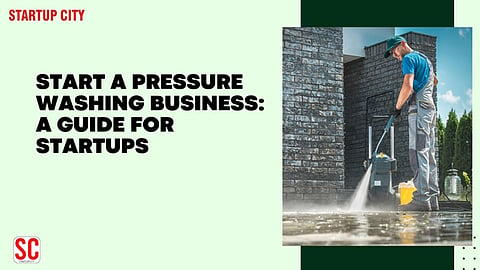

Starting a pressure washing business can be a profitable venture for entrepreneurs looking to tap into a growing industry. Pressure washing is in high demand for cleaning homes, driveways, sidewalks, and commercial buildings, making it a service that attracts both residential and business clients. In this guide, we’ll take you through the essential steps needed to start a successful pressure washing business, from acquiring equipment to marketing your services.
Pressure washing businesses offer a number of advantages:
Low startup costs: You don’t need a large inventory or retail space to get started. The most significant investment will likely be your equipment.
High demand: Homes and businesses frequently require cleaning services, making this a steady market.
Scalability: You can start small and gradually expand by adding more equipment or employees as demand increases.
With relatively low barriers to entry, a pressure washing business is an excellent choice for entrepreneurs seeking flexibility and growth potential.
Before diving into any business, it’s crucial to understand the market demand in your area. Research the types of services that people commonly request. For example, are residential customers more common, or does your area have a high demand for commercial services?
You should also look into your competition. Identify gaps in the services they offer and determine what you can do differently to stand out. This might involve offering specialized cleaning for certain types of surfaces, eco-friendly cleaning solutions, or flexible service hours.
A solid business plan is essential for any startup. Your plan should include:
Business goals: Define your short-term and long-term goals. Are you starting solo, or do you plan to hire a team?
Target market: Identify whether you’ll focus on residential or commercial clients, or perhaps both.
Pricing strategy: Research local pricing to ensure your rates are competitive but profitable. You might charge by the hour, by square footage, or by job type.
Budget: Calculate your initial investment for equipment, insurance, and marketing. Include an estimate of your operating costs, such as fuel, cleaning supplies, and vehicle maintenance.
Every state and locality has different licensing requirements for service-based businesses. Make sure to check your local laws to ensure you're compliant. You may also need to obtain permits for certain jobs, especially if you’re working in commercial areas or with environmentally sensitive chemicals.
Additionally, you’ll need to invest in insurance, particularly liability insurance. Pressure washing involves working with high-powered equipment, and any accidents or damage to property could lead to expensive legal issues without adequate coverage.
The quality of your equipment will directly affect the quality of your service. At a minimum, you’ll need:
Pressure washer: Choose between gas-powered or electric pressure washers depending on the types of jobs you'll handle. Gas-powered washers are more powerful and suited for heavy-duty jobs, while electric washers are quieter and easier to maintain.
Surface cleaners: These are attachments that allow you to clean large flat surfaces like driveways and sidewalks more efficiently.
Cleaning detergents: Use eco-friendly cleaning solutions that are safe for plants and pets, which can set you apart from competitors.
Safety gear: Ensure you have protective clothing, goggles, gloves, and waterproof boots to protect yourself from high-pressure water and chemicals.
Register your business with the appropriate authorities, which might include creating a legal entity like an LLC or sole proprietorship. Consider consulting with a lawyer or business advisor to determine the best structure for your business. You will also need to set up a business bank account to keep your personal and business finances separate.
No matter how skilled you are at pressure washing, potential clients need to know you exist. Effective marketing is key to growing your customer base. Here are some strategies you can use:
Website: Create a professional website that showcases your services, testimonials, and contact information. Optimize it for local SEO by including location-specific keywords.
Google My Business: Register your business on Google My Business so potential customers can easily find your contact details and reviews.
Social media: Use platforms like Facebook, Instagram, and LinkedIn to promote your business and share before-and-after photos of your work.
Flyers and business cards: While digital marketing is important, don’t overlook traditional methods. Distribute flyers in neighborhoods or hand out business cards to local businesses.
Referral programs: Offer discounts or free services to customers who refer new clients to you.
Once your business is up and running, your focus should be on delivering excellent service and building a solid reputation. Happy customers are likely to recommend your services, especially if you’re dependable, professional, and deliver high-quality results.
You can also consider partnering with local businesses or real estate agents who might need regular pressure washing services. Offering competitive packages or discounts for repeat clients can help secure long-term contracts.
Once your pressure washing business gains momentum, you can start thinking about expanding. This might involve hiring additional employees, investing in more advanced equipment, or expanding your service area. You could also diversify your services by offering window cleaning, gutter cleaning, or roof washing.
By continually improving your skills, keeping up with industry trends, and adapting to market needs, your pressure washing business can grow into a highly profitable venture.
Starting a pressure washing business can be a rewarding opportunity for entrepreneurs looking for flexibility, scalability, and relatively low startup costs. By following the steps outlined above, you can lay a solid foundation for your business and position yourself for long-term success.